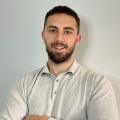THE CHAIRMAN and co-founder of a cancer charity has opened up about his dad's long and stoic battle with the disease and admitted - 'My father’s death inspired me'.
Sir Frederick Hervey-Bathurst, of Little Somborne, first got involved with the Head & Neck Cancer Foundation after seeing his late dad, Sir John Hervey-Bathurst, struggle with the oral disease for some 19 years.
Speaking ahead of Father's Day, Sir Frederick, or Freddy as he is known to friends, said: "My father was of the ‘old school’, a man of immense integrity, hard work, high intelligence and an enquiring mind. He was exceptionally well read and generous to friends and family. After reading economics at Cambridge and spending a short service commission in the Grenadier Guards he enjoyed a successful career in the city - rising to managing director before retiring in 1995, just months prior to being diagnosed with mouth cancer."
Sir John's cancer was discovered on his tongue during a routine visit to his London dentist. He swiftly underwent a gruelling operation which lasted 13 hours and led to part of his tongue, jaw and the top of his mouth being removed.

"At the time dentists did not routinely check for cancers, however my father’s had grown to such an extent (in particular, on the tongue) that it could not be ‘missed’," Freddy said.
"We were immensely fortunate to have been operated upon by Professor Mark McGurk, a world renowned surgeon and leading expert on salivary glands. This led to a lifelong friendship with Mark, his wife Rosemarie and their daughters."
READ MORE: Romsey care home Edwina Mountbatten House to close after it loses battle to stay open
Sir John survived the ordeal - with large thanks to Prof McGurk's skill - and went on to live for another 19 years before dying in 2011 of pneumonia. However, Freddy said the period that followed his operation didn't come without severe difficulty, despite his father's resolve.
He said: "My father's life was impacted greatly as he had been passionate about food and had to live the remainder of his life, almost two decades, on sludge and, perhaps worse, his speech was severely impacted which made communication highly frustrating. He was, however, a very strong character and although very disfigured this did not prevent him going out in public and enjoying life. But for many, if not most others, such disfigurement would be truly horrific and for this reason I implore everyone to regularly check their mouth and visit the dentist at least annually. So, that should they be so unfortunate to develop the disease, at least it will be caught early."
Determined to improve the lives of others struggling with oral cancer after his father's death, Freddy described how a short conversation with Prof McGurk led to the birth of the Head & Neck Cancer Foundation.
"It was a chance question by myself to Mark that led to the creation of the charity," he said.
"From the question I discovered Mark had pioneered a new treatment, sentinel node biopsy, and surgical skills resulting in a less invasive process with reduced trauma - hence why we started. There has since been an enormous impact in the way in which such cancers are treated and we want to educate and train more surgeons in the new techniques pioneered by Prof McGurk. That's our goal for the future. We are not ‘chasing dragons’, the charity advance proven techniques and increases awareness. Without doubt, in my very modest and limited capacity as chairman of the charity, this is the one thing I am most proud of."
Freddy, who now looks after Somborne Park, his father's estate, from which he runs he runs a financial planning business and looks after the deer, said: "My father treasured every moment of his life after his operation but suffered for nearly two decades in ways which would have crushed many individuals. My enthusiasm is driven by a passion borne of what I have witnessed and the knowledge that we can, and will, improve the lives of countless others."
For more information on the charity and its treatments, visit: hncf.org.uk/







Comments: Our rules
We want our comments to be a lively and valuable part of our community - a place where readers can debate and engage with the most important local issues. The ability to comment on our stories is a privilege, not a right, however, and that privilege may be withdrawn if it is abused or misused.
Please report any comments that break our rules.
Read the rules here